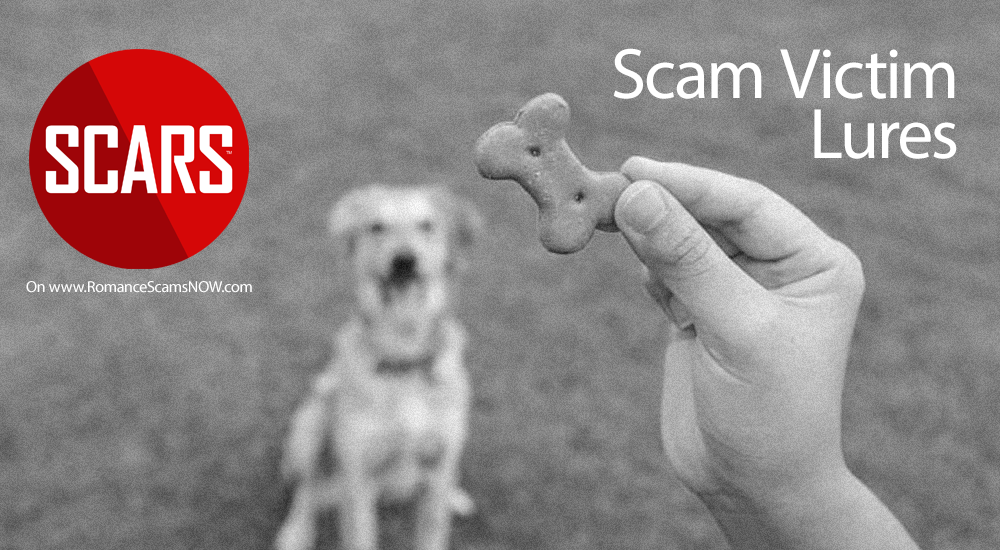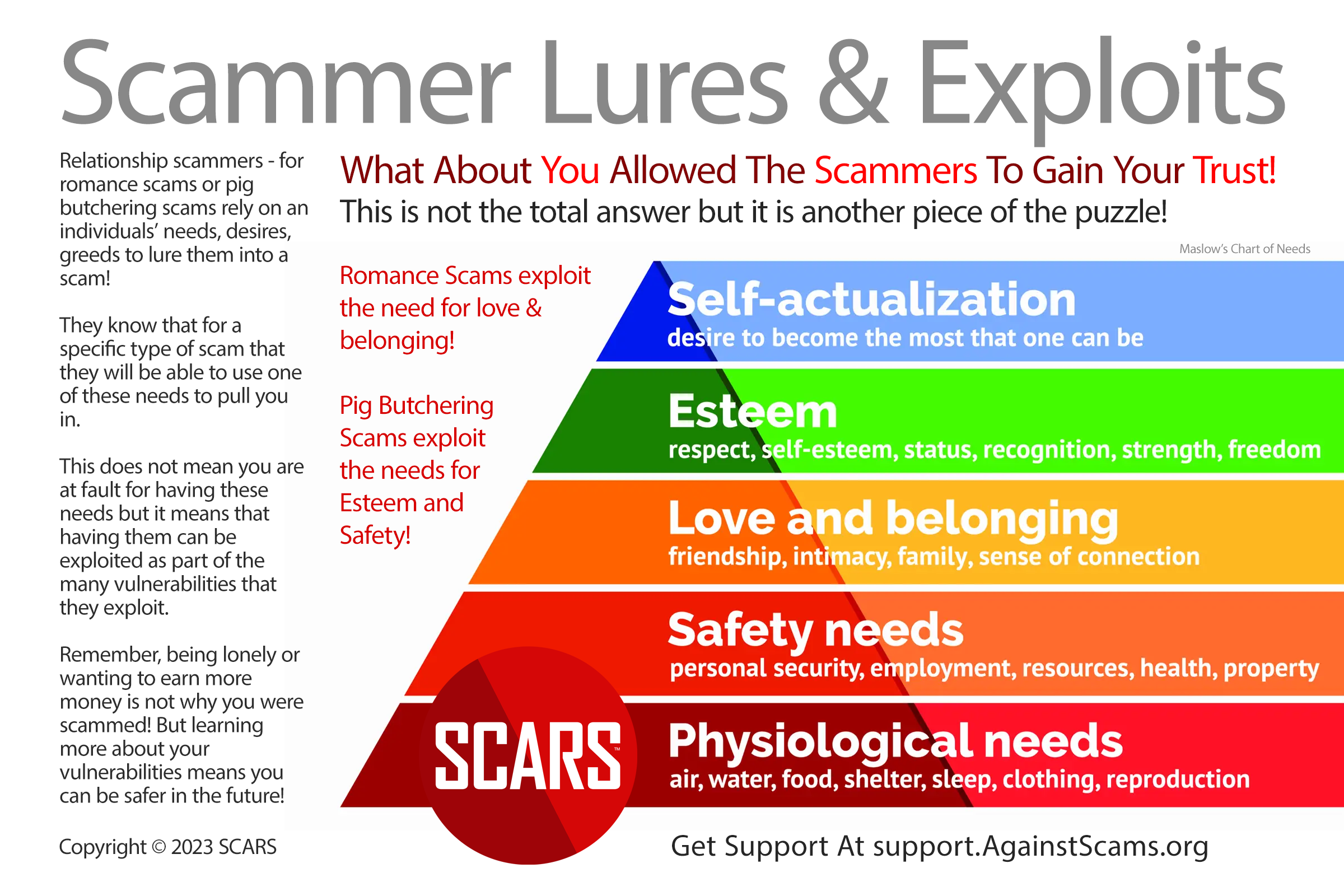Scammers Use And Exploit Victim Needs To Lure Victims In And Control Them
Scammer Lures: Decoding Our Obsession With Needs And Greed
Karl Marx famously said humans are “creatures of need.” But as even this remark suggests, we’ve always been “creatures of want.”
“I’m not needy. I’m wanty.”
Scam victims need to understand how their needs can be exploited and used to lure them into the scam. These are some of the more basic scammer lures they use.
Understanding them can help you both understand what happened to you but also how to avoid scams in the future.
Where Did Our Obsession With Needs And Need Fulfillment Begin?
The most visible resource for this is Maslow’s Hierarchy of Needs. This eminent psychologist proposed that humans are not nearly as transparent in their motivations as the word “need” suggests. We are not driven purely by necessities. Instead, Maslow delved into our collective psyches and unearthed different kinds of needs.
Perhaps Maslow’s limitation — and therefore of those who adopt his framework — is the sweeping label of “needs” he gives to the higher-order life drivers. More appropriately, these are desires. Or, as we could call them, greeds. We use the words greed, desire, and want interchangeably to signal that consumption is no longer driven by necessity.
The Key Point Is That Needs Are Finite, And We Have Long Moved On From Satisfying Them. Greeds, On The Other Hand, Are Infinite
Consider that physiological “needs” are as basic as breathing. However, we no longer merely “need” to breathe to live. We want air purifiers, humidifiers, dehumidifiers, air conditioners, air fresheners, and nonpolluting vehicles. We want rejuvenating areas that satisfy our craving for space that doesn’t cramp us physically or psychologically. Spas are as much a solution for better breathing as they are for better being.
Shoes were originally created in response to a safety “need,” to protect feet from dust, grime, and harm from protruding objects on the ground. We only needed one pair, until they wore out then we needed another. Today, we desire shoes to match our clothes, our occasions, our personalities, and our social milieu. The biggest clue to where the future lies though is still in the plaintive cry of “I need new shoes!” we continue to hear from people.
Our sustenance needs food. But we crave a lot more from food than mere hunger satisfaction. We want to satisfy our desires for gluttony, for things gourmet, for comfort (“just like mom’s cooking”,) bragging rights (“you haven’t eaten at Salt Water Café yet? Where do you live?”,) achievement (“you haven’t arrived until you get the corner table at Bungalow 9”,) and so much more. For protection from the elements, we need shelter. But we want a lot more from the place we live in: elegance, attitude, vibrancy, the right vista, the right address, the right neighbors, the right amenities, the right schools in the neighborhood, the right conveniences, and the social signals that emanate from having all of the preceding.
It is obvious that needs have given way to desires. The hidden truth is that we are all also well on our way to turning desires into needs. Or at least in articulating our desires as our needs.
A new perspective thus emerges of what drives consumption, and in fact, human behavior. The second, deeper meaning is this: Needs define a category (eg food, hunger satisfaction), but desires define societal segments (eg victims, connoisseurs, social butterflies, achievers). Distinct segments desire different inputs and outcomes. And we gravitate toward them instinctively. But criminals use them to exploit us all – they become the scammer lures that enable the scam.
Consider a 21st-century category such as social networking
Social networking serves the need of people to connect with one another. Some people gather on Twitter, friends and family often prefer Facebook, relationship seekers go to dating websites & apps, entertainment seekers throng YouTube, geo-proximate people congregate on FourSquare, the visual stimulus enthusiast community hangs out on Instagram and Pinterest, and so on.
In simpler times, needs were much simpler. Today’s consumers, however, follow a more complex pattern of behavior. Abundant supply and choice in the marketplace signal the primacy of want (or desire or greed) in driving consumption.
So Why Are We Talking About This?
Because this is a driver of part of your vulnerability to scams, fraud, and deception we need you to understand how it plays into vulnerability and becomes a scammer lure. It is a tool that serves as scammer lures that pulls victims into the scam
However, the criminals’ success lies not just in catering to a victim’s wants. That is merely the first step. Lasting success comes from turning that want, that greed into a need over and over again throughout the life of the crime. Basic human nature, even in times of prosperity, tends to be predictably rational (or irrational, actually) in more easily justifying need fulfillment over greed fulfillment for fear of being judged by society as wanton creatures. The elusive formula, then, is to (a) go beyond need, (b) cater to greed, and (c) convert greed to need, in order to create enduring victims.
The bottom line is this. In seeking such desires, people turn to places (in the real world and online) where they think they will find it — as much for desire fulfillment as for choice, experience, and kinship with others who have sought fulfillment of the same desires. Then this becomes the way thatHow did we come to this?
Why did we explore this? Because this is part of what led you into the scam – this is a primary lure mechanism, and the scammers use this helps maintain passivity during the scam. In other words, this is an initial vulnerability and then exploited becomes part of the control mechanisms.
How Does This Apply To Different Scars?
The following will help you understand how needs set you up for failure and served as lures that scammers use to pull you in.
- Romance scams – the need in this case is the need for a relationship. Even if the victim did not want a relationship there was a need for human connection – someone to talk to and who would listen.
- Pig Butchering Scams – these begin in much the same way as a romance scam with basically the same need, but instead of carrying through on the full level of manipulation, the scam flips the need to a different type of greed. Why do people invest? They want what more money brings – so instead of heavy manipulation, this need drives the scam through to the end.
- Lotto Scams – this is a simpler kind of need or greed, the desire for a boatload of money, not at investment levels, but money falling from the sky levels.
- Phone Scams – most phone scams are based upon a desire for safety – they are fear-based – someone or something is in trouble and the person on the phone can fix it and take away the fear.
- Phishing Scams – these are the outliers, there is really no specific desire per se. The message can define the desire, but often it is just poor impulse control that results in these.
In essence, these are the desires, needs, greeds, that scammers use to lure you in. But once lured in, they own you until the scam ends or they make a functional mistake during their execution of the crime.
But You Felt It Was Not Right?
Keep in mind that victims often sense things during the scam. We don’t disagree with that, but we do not believe it is what victims believe they are.
- In a romance scam, it is also an abusive relationship. So victims sensed the abusive aspects of it without being aware of the crime.
- In the case of investment scams, it is often the case that the victim will have doubts about the amount of money they are investing – a kind of advance remorse or doubts – not about the crime being committed, but just about the investment risk itself.
Summary
It is very important to eventually deconstruct the scam into its relevant parts so that you can understand why it happened, what the initial mistake was, and why you are not to blame.
Your biases and coping mechanism will tell you it was different than this, but when you have the ability to think this through you will come to accept it.
In the meantime, accept that you are the victim of well-trained professional criminals and you were neither prepared nor skilled enough to avoid the scam.
There is no shame or blame in that!
-/ 30 /-
What do you think about this?
Please share your thoughts in a comment below!
Do You Need Support?
Get It Now!
SCARS provides the leading Support & Recovery program for relationship scam victims – completely FREE!
Our managed peer support groups allow victims to talk to other survivors and recover in the most experienced environment possible, for as long as they need. Recovery takes as long as it takes – we put no limits on our support!
SCARS is the most trusted support & education provider in the world. Our team is certified in trauma-informed care, grief counseling, and so much more!
To apply to join our groups visit support.AgainstScams.org
We also offer separate support groups for family & friends too.
Become a
SCARS STAR™ Member
SCARS offers memberships in our STAR program, which includes many benefits for a very low annual membership fee!
SCARS STAR Membership benefits include:
- FREE Counseling or Therapy Benefit from our partner BetterHelp.com
- Exclusive members-only content & publications
- Discounts on SCARS Self-Help Books Save
- And more!
To learn more about the SCARS STAR Membership visit membership.AgainstScams.org
To become a SCARS STAR Member right now visit join.AgainstScams.org
To Learn More Also Look At Our Article Catalogs
Scam & Crime Types
More SCARS
- ScamsNOW Magazine – ScamsNOW.com
- ContraEstafas.org
- ScammerPhotos.com
- AnyScam.com – reporting
- AgainstScams.org – SCARS Corporate Website
- SCARS YouTube Video Channel












![An Example of How Scammers Use Emergency Scams - 2014 [UPDATED 2024] - on SCARS RomanceScamsNOW.com](https://romancescamsnow.com/wp-content/uploads/2014/06/emergency-scams.png)

Please Leave A Comment - Tell Us What You Think About This!